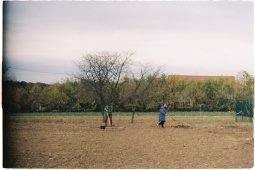News from the Station
The Experimental Station for Research on Art and Life,
Int. Primaverii no. 10, Silistea Snagovului village,
North of Bucharest, Romania
Dear friends, followers and distant readers,
It has been a tough year for us at the Station: drought, sorrow, building work advancing too slowly and older age settling in too quickly. Yet: the plants we saved from being completely scorched, the vegetables that our neighbours still managed to harvest, the new neighbours who did not let themselves discouraged and joined us on the lands nearby the Station, the friends who came to plant and the new visitors who came to listen, what we did manage to build, the allies and peers from distant places, the sunsets and the green grass emerging after the rain, the insects we didn’t have last year, the lizards called Sam, they were all so many reasons for encouragement, helping us to counter the agenda of doom guiding life in other places, close and afar.
December should have been a time of celebrating our collective survival for another year, instead, we find ourselves stranded in the only territory that still feels safe for the moment: our imaginary of hope, our horizon of trust in people’s desires for the common good rather than for the individual capitulation in front of the apocalypse. We (people at and around the Station, birds, artichokes, insects, lizards, stray dogs and more) think this territory can be as wide as we want to stretch it, as fertile as we struggle to irrigate it, as welcoming as we dare to make it.
While admitting our understanding of the territory can be turned upside down, our birds can be heard by some singing songs of fascist criminals, our sunsets can be painted in the colours of the national flag, our reference to the land and the resources can be framed as a “natural” endowment to the nation, we know none of these are “ours” and at the same time we claim them back from “their” claws.They/them, not the voters, not the masses of voters for the right, not our neighbours from the village, not our relatives from the diaspora, they/them who are making these propositions from a position we have seen before, we are witnessing all around, the position of messianic power which is in fact only protecting the interests of the few, opportunism and populism, capitalism and fascism, ethno-nationalism and neo-feudalism, all disguised as anti-systemic proposals.
In a recent article*, our colleague from the Station, theorist Ovidiu Tichindeleanu, asks the legitimate questions in relation to the far-right capitalization of the topics on which the left, us in fact, ground our work.
“The extreme right is the one expressing today a critique of the real process of the atomization of communities. It thus responds to a real problem, yet channeling it regressively, towards the miraculous solution and the purifying myth of the ‘traditional family’. Does this mean that the left should abandon the projects of the reconstruction of solidarity, social recomposition and community revitalization?
Today, the extreme right is one of the few forces that publicly expresses a critique of war, while all around the path of arming and militarization is imposed without debate. Does this mean that the left is to abandon pacifism, the critique of inter-imperial rivalries, and the work at constituting other kinds of international relations?
Today the extreme right is the one to express a critique of the excess and reckless consumption of resources, while channeling this critique in an argument in favor of the necessity of hardening the central authority. Does this mean the left ought to abandon the critique of extractivism and capitalist consumerism?
One part of the extreme right expresses even a critique of the larger ecological problems, channeling however their concern for food sovereignty, for the state of waters and forests into a process of capitalization of resources to the exclusive benefit of Romanian-ness. It’s still a capitalization. Does this mean though that the left should abandon the ecologic struggles?”
Our work with the land is also a work of delinking the land from the narratives of the nation, our mapping of the natural resources around which we try to build a community is also a work of showing the limitedness of these resources and the fragile ecosystems they maintain together with the humans, our shifting from the mainstream forms and formats of cultural production is a way to open other horizons, not a retreat to self-centered isolationist narcissistic practices. Our work with the land is a way to test our theories and to make them reemerge with less arrogance and more purpose, to give them a body and a soul, a reason and a solid foundation.
There is no single moment when we shouldn’t emphasize the importance of distancing ourselves from the toxic appropriation, by both the corporate greenwashing capitalism and by the fascists from all strata of society, of all discourses appealing to people’s desires to have meaning in their lives and futures conceivable for their children. Yet, our struggles should be the struggles of a wider left, of a wider cultural community, who can understand theory and practice closer together, who can step out of air-conditioned rooms before talking about climate change, and who can listen to historical genealogies when using plant names. We will continue to do this work.
*https://www.criticatac.ro/defetism-si-degringolada-zece-puncte-pentru-deschiderea-optiunilor/*https://www.criticatac.ro/defetism-si-degringolada-zece-puncte-pentru-deschiderea-optiunilor/
